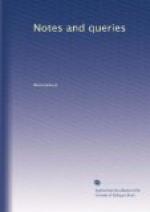Barwick was upon another occasion assisted in a work against the League and Covenant, published in 1644, by William Lacy of St. John’s, Isaac Barrow of Peter-House, Sethward of Sidney College, Edmund Baldero, and William Quarles of Pembroke Hall, and Peter Gunning of Clare Hall. It is not an improbable conjecture that some of these distinguished men assisted in the composition of the Querela.
A.B.R.
Easton.
"Then” for “than."—At the end of Selden’s Titles of Honour (edit. 1631), after the list of “Faults escapled in print,” occur the words, “may with no less difficulty be amended then observed?” Was the word then commonly used in the sense of than; or is it a misprint?
P.H.F.
[Dr Latham, in English Language, p. 377. (3d ed.), observes. “As to the word than, the conjunction of comparison, it is a variety of then; the notions of order, sequence, and comparison, being allied. This is good; then (or next in order) that is good, is an expression sufficiently similar to this is better than that to have given rise to it.”]
Doctrine of the Immaculate Conception (Vol. ii., p. 407.).—“The Papal decision” referred to may probably be found in the Popes Letters of 2nd Feb. 1849, and of 20th May, 1850. The former professes to seek for information on this question from the priests and bishops of the whole Catholic world, but at the same time it enunciates clearly the Pope’s opinion in favour of the doctrine.
J.H.M.
Bath.
In the Catholic Annual Register for the Year ended 30th June, 1850, published by Dolman, will be found the recent Allocution of his Holiness Pius IX., a Pastoral of the Cardinal Wiseman, and one from the bishops of America on this subject; from which your correspondent L. will be fully able to discover the present state of the doctrine of the Catholic Church on this mystery.
FESTE.
Letters of Horning (Vol. ii., p. 393.).—Letters of Horning, in the law of Scotland, are writs issuing under the signet of the sovereign (used in the Supreme Court, or Court of Session, for signifying the sovereign’s assent to writs issuing from that court) obtained by creditors, commanding messengers at arms
“To charge the debtor to pay or perform his obligation within a day certain.” ... “If payment be not made within the days mentioned in the horning, the messsenger, after proclaiming three oyesses at the marketcross of the head borough of the debtor’s domicil, and reading the letters there, blows three blasts with a horn, by which the debtor is understood to be proclaimed rebel to the king for contempt of his authority.”
Sec. 26. “Denunciation, if registered within fifteen days, either in the sheriff’s books or in the general register, drew after it the




